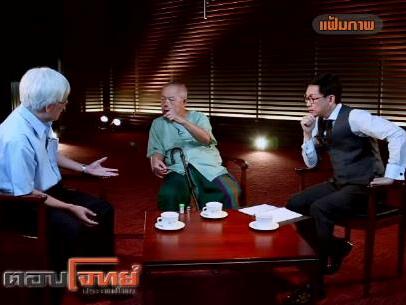An initiative to discuss the issue of the Thai monarchy on public television hit a snag when an episode of the political talk show was abruptly cancelled, prompting a heated debate on the how such issues should be tackled.
A pioneering initiative to discuss the sensitive issue of the Thai monarchy on public television hit a snag when an episode of the political talk show was abruptly cancelled on 15 March, prompting a heated debate on the how such issues should be tackled, or if it should be discussed at all.
Executives of the Thailand Public Broadcasting Service (TPBS) pulled out the fifth and final episode of the talk show series “Tob Jote Prathet Thai” (“Answering Thailand’s Questions”), in response to protests over the content of the show.
The episode featured a debate between two scholars, Somsak Jiamtheerasakul and Sulak Sivaraksa, as part of a “Tob Jote” series which tackled issues surrounding the constitutional monarchy. The series was the first ever to discuss these issues openly on Thai television.
But on the night of the airing of the final episode, a group of protesters showed up at the Thai PBS headquarters demanding the cancellation of episode claiming that the speakers talked about the monarchy improperly. Protesters threatened to mobilize more people and take the law into their own hands if the show was not cancelled.
“Tob Jote” producer and host Pinyo Traisuriyathamma questioned the decision of the TV station executives to cancel the program, when they had earlier approved it for broadcast.
TPBS executives explained that they cancelled the episode for fear of sparking social conflict.
Later, Pinyo announced that as a result of the cancellation he will resign his post as producer of the series because of interference and intimidation on his work as a journalist.
However, after conducting another review of the episode, TPBS decided to broadcast the controversial episode the following Monday, 18 March, prompting another protest to demand the resignation of the station director Somchai Suwannaban.
Somchai said later that despite the resignation of Pinyo the program would continue to discuss controversial social issues.
The cancellation of “Tob Jote” has prompted an investigation of the series on two fronts.
First, the National Broadcasting and Television Commission (NBTC) will investigate the cancellation of the program with a view toward reviewing the rules governing the prerogatives of stations to cancel TV shows.
NBTC is reviewing a similar case of a TV show cancellation in February involving a soap opera broadcast on TV3, a state-owned broadcasting company.
Second, the Royal Thai Police will investigate whether the contents of the “Top Jote” TV series violated article 112 of the Penal Code, otherwise known as the lese majeste law, which prohibits defamation of the King, heir-apparent and the Regent.
Police said that the show concerns a matter of national security, and warned that persons reposting remarks of the show’s panellist may also be breaching the law.
The police chief has also ordered authorities to monitor whether the program was posted online and also ordered all stations to accept lese majeste complaints filed in relation to the case.
Police investigators reviewing the series have found content that violated the lese majeste law, according to a police spokesman.
Meanwhile, some Thai authorities reacted to the show even more strongly, suggesting that issues raised by “Tob Jote” should not be discussed at all.
General Prayuth Chan-Ocha, commander of the Royal Thai Army, described the program as “inappropriate”, saying this was not the right time to discuss such issues at a time of political conflict.
Prayuth also defended the use of the lese majeste law, saying the royal institution cannot protect itself.
In addition, five Thai senators criticised the show, saying it was very offensive to the monarchy and violated article 112 of the Penal Code.



